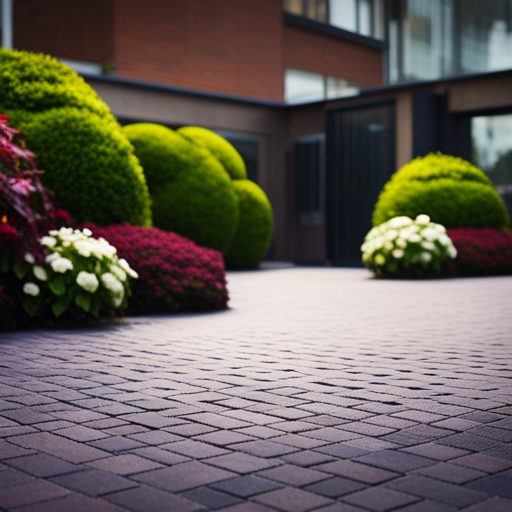Waterproof Flooring Solutions for Basements

Discover the ultimate solution to protect your basement from water damage with our comprehensive guide to waterproof flooring.
From luxurious vinyl to durable tile options, we explore the latest in moisture-resistant materials to safeguard your home.
Gain valuable insights into installation, maintenance, and cost considerations to make an informed decision for your basement renovation project.
Say goodbye to water-related headaches and hello to a beautiful, worry-free space with our expert advice on waterproof flooring solutions.
Importance of Waterproof Flooring
One must recognize the paramount importance of waterproof flooring in basements to mitigate potential water damage and mold growth. Waterproofing solutions play a critical role in preventing moisture from seeping into the basement, thus safeguarding the structural integrity of the building. Basements are particularly vulnerable to water ingress, and without adequate protection, they are susceptible to a range of issues including dampness, mold, and damage to the flooring material. Therefore, implementing waterproof flooring is essential for basement protection, as it ensures durability and longevity of the space.
Moisture prevention is at the core of basement waterproofing solutions. By installing waterproof flooring, homeowners can create a barrier against water infiltration, reducing the risk of costly damage and the potential health hazards associated with mold and mildew. Furthermore, waterproof flooring contributes to the overall longevity of the basement, providing a sustainable and resilient surface that can withstand the challenges of a high-moisture environment.
Types of Waterproof Flooring
When considering waterproof flooring options for basements, it is essential to explore the different types available to determine the most suitable solution for the specific needs of the space. The table below provides an overview of material options and durability factors for waterproof flooring.
| Material Options | Durability Factors |
|---|---|
| Luxury Vinyl | – Waterproof |
| – Scratch-resistant | |
| – Easy to install | |
| Ceramic Tile | – Waterproof |
| – Durable | |
| – Cool underfoot | |
| Concrete | – Waterproof |
| – Extremely durable | |
| – Industrial look | |
| Rubber | – Waterproof |
| – Comfortable | |
| – Impact-resistant | |
| Engineered Hardwood | – Waterproof |
| – Real wood look | |
| – Resistant to warping |
Each type of waterproof flooring offers unique advantages, making it important to consider the specific requirements of the basement when making a selection. Understanding the material options and durability factors can help homeowners make an informed decision that best suits their basement needs.
This comprehensive analysis will provide a smooth transition into discussing the benefits of waterproof flooring in the subsequent section.
Benefits of Waterproof Flooring
What are the advantages of choosing waterproof flooring for basements, and how do these benefits cater to the specific needs of the space?
Waterproof flooring offers long-term durability and moisture resistance, making it ideal for basement environments where dampness and potential water intrusion are common concerns. Unlike traditional flooring materials, waterproof options such as vinyl plank, ceramic or porcelain tile, and concrete coatings are designed to withstand moisture without warping, delaminating, or fostering mold and mildew growth. This ensures that the flooring will maintain its structural integrity and aesthetics over time, even in the presence of moisture.
Additionally, waterproof flooring provides aesthetic and comfort benefits. It comes in a wide range of styles and designs, allowing homeowners to achieve the desired look for their basement while also providing a comfortable underfoot feel. These benefits cater to the specific needs of basement spaces by offering a solution that can withstand the unique challenges of moisture and humidity, while still providing a visually appealing and comfortable surface for the area.
Transitioning into the subsequent section about ‘considerations for basement flooring,’ it’s important to understand the various factors to consider when selecting the most suitable waterproof flooring for a basement.
Considerations for Basement Flooring
The selection of waterproof flooring for basements necessitates careful consideration of factors such as moisture levels, durability, and design preferences. When contemplating basement flooring, several crucial considerations come into play:
-
Moisture Resistance: Given the inherently higher moisture levels in basements, it’s imperative to choose flooring materials with exceptional moisture resistance to prevent water damage and mold growth.
-
Durability: Basements often serve as high-traffic areas or storage spaces, so the flooring must be durable enough to withstand heavy use and potential impact from items being moved or stored.
-
Subfloor Preparation: Adequate preparation of the subfloor is essential to ensure a flat, dry, and clean surface before the installation of waterproof flooring materials.
-
Design Preferences: While functionality is key, considering the aesthetic appeal and how the flooring complements the overall design scheme of the basement is also important.
-
Maintenance Requirements: Understanding the maintenance needs of different waterproof flooring options is crucial for long-term satisfaction and durability.
With these considerations in mind, the subsequent section will delve into the installation of waterproof flooring in basements.
Installation of Waterproof Flooring
When it comes to the installation of waterproof flooring in basements, it is essential to consider the best installation practices and cost-effective methods.
Proper installation is crucial for ensuring the effectiveness of waterproof flooring solutions, and understanding the most suitable methods can lead to successful and long-lasting results.
Best Installation Practices
A crucial aspect of successful installation of waterproof flooring in basements is ensuring thorough surface preparation to guarantee long-lasting performance. When installing waterproof flooring, it is essential to follow best practices to ensure the effectiveness of the system.
Here are some key installation practices to consider:
-
Moisture Barrier: Install a high-quality moisture barrier to prevent water vapor from seeping through the flooring.
-
Subfloor Preparation: Thoroughly clean and level the subfloor to ensure a smooth and even surface for the waterproof flooring installation.
-
Acclimatization: Allow the flooring material to acclimate to the basement environment for the recommended period before installation.
-
Adhesive Selection: Use an appropriate adhesive that is specifically designed for waterproof flooring to ensure a strong and lasting bond.
-
Seam Sealing: Properly seal the seams of the waterproof flooring to prevent water intrusion and enhance the overall waterproofing performance.
Cost-Effective Installation Methods
To achieve cost-effective installation of waterproof flooring in basements, meticulous planning and efficient utilization of resources are essential.
Cost-saving techniques such as opting for do-it-yourself (DIY) installation can significantly reduce expenses. DIY installation allows homeowners to save on labor costs, provided they have the necessary skills and knowledge. It is important to thoroughly research and understand the installation process, ensuring that the correct materials and tools are used.
Additionally, considering modular or interlocking waterproof flooring systems can simplify installation, reducing the need for professional assistance. While cost-effective methods can offer savings, it is crucial to prioritize the quality and durability of the flooring to avoid future repair or replacement expenses.
Transitioning into the subsequent section about ‘maintenance and cleaning tips’, it is important to note that proper installation is the foundation for easy maintenance and long-term cost savings.
Maintenance and Cleaning Tips
Proper maintenance and regular cleaning are essential for preserving the integrity and longevity of waterproof basement flooring. When it comes to maintaining and cleaning waterproof flooring in basements, there are several important tips to keep in mind:
-
Stain removal: Promptly address any spills or stains to prevent them from setting into the flooring. Use a mild cleaning solution and a soft brush or cloth to gently scrub the affected area, avoiding harsh chemicals that could damage the waterproof seal.
-
Preventing mildew: Basements are prone to high humidity levels, which can lead to mildew growth. To prevent this, ensure proper ventilation in the basement and use a dehumidifier if necessary. Additionally, regularly inspect the flooring for any signs of moisture or mildew and address any issues promptly.
-
Regular sweeping and vacuuming: Keep the waterproof flooring clean by regularly sweeping or vacuuming to remove dirt, dust, and debris. This helps prevent scratches and maintains the overall appearance of the flooring.
-
Avoid abrasive cleaners: Harsh or abrasive cleaners can damage the waterproof sealant and wear down the flooring over time. Stick to gentle cleaning solutions recommended by the flooring manufacturer.
-
Professional maintenance: Consider scheduling professional maintenance and inspections to ensure that the waterproof flooring remains in optimal condition. Professional cleaning and maintenance can help extend the lifespan of the flooring and address any potential issues early on.
Comparing Waterproof Flooring Options
When comparing waterproof flooring options for basements, it is important to consider factors such as durability, installation ease, and maintenance requirements.
Durability is a key aspect to examine when evaluating different waterproof flooring options. For basements, where moisture and potential water exposure are significant concerns, choosing a flooring material that can withstand these conditions is crucial. Some options, such as luxury vinyl planks or tiles, offer high durability and are resistant to water damage. On the other hand, laminate flooring, while offering good water resistance, may not be as durable in the long run when exposed to excessive moisture.
Additionally, considering design options is essential when comparing waterproof flooring. Homeowners can select from a variety of styles, colors, and patterns to complement their basement decor. Luxury vinyl, for instance, provides a wide range of design choices, including options that mimic the look of natural wood or stone. This allows homeowners to achieve both functionality and aesthetic appeal when selecting a waterproof flooring solution for their basement.
Cost Considerations and Budgeting
Considering the durability and design options previously discussed, it is essential to factor in cost considerations and budgeting when selecting a waterproof flooring solution for basements. Cost saving strategies and budget-friendly options can help homeowners achieve a functional and aesthetically pleasing basement without breaking the bank.
Here are some factors to consider when budgeting for waterproof flooring:
-
Material Costs: Compare the upfront costs of different waterproof flooring materials such as luxury vinyl, ceramic tile, or engineered wood to find the most budget-friendly option.
-
Installation Expenses: Consider the installation costs, including labor and any additional materials required for subfloor preparation and moisture barriers.
-
Long-Term Durability: Evaluate the long-term cost-effectiveness of the flooring options by considering their durability and maintenance requirements.
-
Warranty and Lifespan: Look for products with longer warranties and extended lifespans, as they may offer better value in the long run despite higher initial costs.
-
DIY vs. Professional Installation: Assess the feasibility and cost-effectiveness of DIY installation versus hiring professionals.
Frequently Asked Questions
Can Waterproof Flooring Be Installed Directly Over a Damp Basement Floor?
Yes, waterproof flooring can be installed directly over a damp basement floor by using a moisture barrier and proper installation techniques. It’s crucial to choose flooring materials with high moisture resistance to prevent damage.
Are There Any Specific Waterproof Flooring Options That Are Best for Basements With High Humidity Levels?
When it comes to basement flooring in high humidity areas, it’s crucial to choose moisture-resistant materials. Options like luxury vinyl, ceramic tile, and epoxy coatings offer durability and water resistance, making them ideal for high traffic areas.
What Are the Best Maintenance Practices for Keeping Waterproof Basement Flooring in Good Condition?
To maintain waterproof basement flooring, regular cleaning methods should be employed to remove debris and prevent moisture buildup. Additionally, sealant application at recommended intervals helps to uphold the flooring’s waterproof properties and prolong its durability.
Are There Any Specific Considerations for Installing Waterproof Flooring in a Basement With Potential for Flooding?
When installing waterproof flooring in a basement with potential flooding, specific considerations include selecting suitable waterproofing methods, ensuring effective moisture barriers, and choosing appropriate subfloor options to mitigate water damage and ensure long-term durability.
How Do the Costs of Waterproof Flooring Compare to Traditional Basement Flooring Options?
When comparing the costs of waterproof flooring to traditional options, factors such as flooring durability and environmental impact should be considered. Waterproof flooring may have a higher initial cost but can offer long-term benefits and environmental advantages.
Conclusion
In conclusion, waterproof flooring is essential for basements to prevent water damage and mold growth. With various types of waterproof flooring available, it is important to consider factors such as durability, installation, and maintenance.
Budgeting for waterproof flooring is also crucial, as it can impact the overall cost of the project. Like a sturdy ship navigating through rough waters, waterproof flooring provides a reliable and secure foundation for basements, ensuring long-term protection and peace of mind.

Rubin Everest, a seasoned expert in the world of flooring, brings a wealth of knowledge and passion to the surface. As the mind behind ebbow.com, Rubin is dedicated to sharing insights on the latest trends, innovative solutions, and expert advice in the realm of flooring. Whether you’re seeking practical tips for installation or design inspiration, Rubin Everest is your go-to source for all things flooring-related, making your journey to the perfect floor an informed and enjoyable experience.





